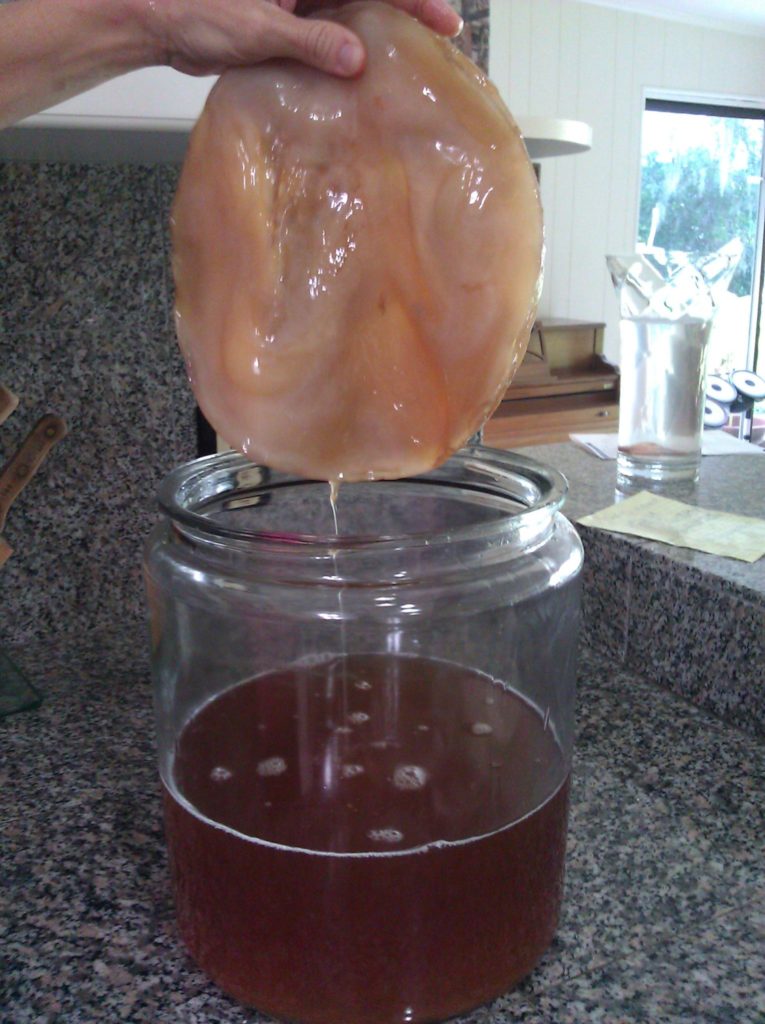 We all know and love our SCOBY cultures, right? The traditional, delicious, probiotic and enzyme rich beverage they create known as kombucha has been consumed for centuries in Russia although its origins are based in China.
We all know and love our SCOBY cultures, right? The traditional, delicious, probiotic and enzyme rich beverage they create known as kombucha has been consumed for centuries in Russia although its origins are based in China.
Those of you who have been making this healthful drink for any length of time know that after awhile, you have quite a few extra cultures each time you ferment a batch. You can either give these away to friends who want to start brewing their own kombucha or you can use them to make the best compost.
BUT!
Warning. The following is from the Real Food X-Files.
Did you ever think that your leftover kombucha cultures could be used to make organic clothing?
Grow not only your own food, but your own clothing as well?
Fashion designer Suzanne Lee is doing just that by harvesting kombucha cultures to make organic, sustainable clothing from shoes to jackets and vests.
The kombucha fibers are made of pure cellulose spun by the beneficial bacteria and yeasts that comprise the culture, in essence a microbial version of silkworms spinning silk!
Check out this short TED video where Suzanne Lee demonstrates this intriguing process she has developed for growing rather than manufacturing clothing.
More Information
Want to know more about kombucha? These articles provide more detail for your research.
Fluoride in Kombucha: Should You Be Concerned?
Can Candida Sufferers Drink Kombucha?
Does Kombucha Prevent Grey Hair?
Batch vs Continuous Brew Kombucha
Have You Tried Kombucha?
Safe Traveling with Kombucha








Also, they are transparent when dried so keep that in mind!
We just have to figure out/engineer a way to waterproof it…sustainably <3
Scratch my previous birthday wishlist. I want a kombucha shirt! http://t.co/JlGEYRd
I think the idea is awesome, but be prepared for someone to come along and blast it as unsafe. If it really could be used in the medical world in some way and if it can’t be patented the pharmaceutical companies will find every way they can to disprove its worth and even claim it to be dangerous or harmful.
One problem – it doesn’t yet remain stable when wet.
That is cool, the only thing that concerns me is that they want to “change” the microbe. Do we really want to create a super bug that changes the kombucha we drink? Isn’t that how we got in trouble with GMO’s? Or am I misunderstanding her?
Thats a good thought to keep in mind. I wouldn’t want something to happen to change the cultures.
We should never GM anything. We already have GM bacteria so there is no possibility to stop that as the bacteria and its yeasts and virus exchange DNA freely (between species, yes). If GM bacteria were to get into my Kombucha pot would I ever know it? I do not think this is possible as those new patented bacteria are owned by the huge probiotic yogurt commercial entities. They can become airborne though. But we do not know the repercussions of creating franken-bacteria. That remains to be discovered. Naturally occurring changes are of course within the limits of natural changes.
I am with you. Say no to GMO! Keep biotech off our kombucha!!
The combination of biology and fashion. An amazing discovery still working out the ‘bugs’. http://fb.me/10a1Yvv28
We too have wondered what else we could do with our extras. We compost… have used it on a wart, facials, wounds, …. I guess we could make a “Texas Chainsaw Massacre” type of mask for Halloween… it does look like human flesh. LOL
I also heard dehydrate and use for dog treats, but my pup turned up his nose- then again, he is picky…
I saw this a month or so ago on NPR.
Kombucha: Drink It and …. Wear It? – The Healthy Home Economist: http://t.co/bDl96oU